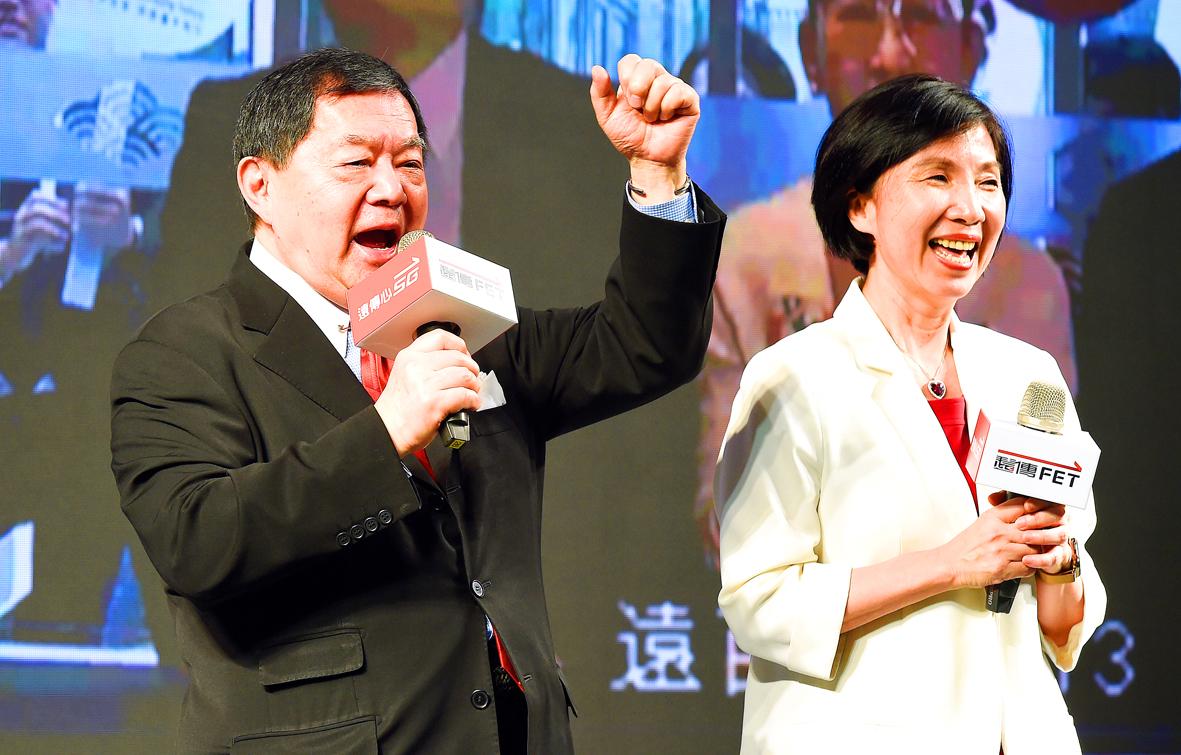Far EasTone Telecommunications Co (遠傳電信) yesterday said it plans to spend up to NT$30 billion (US$1.01 billion) on 5G network deployment over the next three years as it expects half of its mobile subscribers to migrate to 5G services by 2023.
That implies about 3.54 million subscribers switching to 5G, based on the company’s 7.08 million subscribers as of the end of February.
To meet its goal of achieving a 50 percent penetration rate for 5G, “an investment of NT$20 billion to NT$30 billion is inevitable in the first three years,” Far EasTone president Chee Ching (井琪) told a media briefing in Taipei, as the company formally started its 5G services yesterday.

Photo: Liao Chen-huei, Taipei Times
The investment does not include those allocated for private network deployment for enterprise clients, Ching said.
Far EasTone has signed an agreement to build a private network for chip designer MediaTek Inc (聯發科), with more than 40 potential enterprise clients in the pipeline, she said.
The company expects enterprise clients, which currently account for 20 percent of revenue, to gradually expand their contribution, she said.

Photo: Liao Chen-huei, Taipei Times
“Enterprise business is a growth engine for the company as a saturated consumer market is constantly driving prices lower,” Ching said.
Far EasTone said it aims to make NT$13 billion in revenue from non-telecom services this year.
It has budgeted NT$10.2 billion for capital expenditure this year, mainly for 5G network buildout.
Its target is to have more than 4,000 5G base stations installed by the end of the year, mainly in urban areas with a higher population density.
Having 1 million of its subscribers upgrade to 5G in the next 12 months is a “very achievable” goal, Ching said, adding that it would have been even easier to attain without the COVID-19 pandemic.
5G uptake might be a bit slow due to a limited selection of 5G smartphones, as fewer consumers can afford them, Ching said.
The company expects Apple Inc’s new phone and mid-range models by other brands to be launched either later this month or next month, which would help accelerate 5G subscriptions, she said.
A mid-range 5G phone would be priced between NT$15,000 and NT$20,000, she added.
Far EasTone currently offers three models — from Samsung Electronics Co, Sharp Corp and Sony Corp — which are bundled with its 5G rate plans starting from NT$599 to NT$2,699 a month, depending on data transmission speed and volume.
Consumers can get unlimited data by paying NT$1,399 a month, on par with prices offered by rivals Chunghwa Telecom Co (中華電信) and Taiwan Mobile Co (台灣大哥大).

Vincent Wei led fellow Singaporean farmers around an empty Malaysian plot, laying out plans for a greenhouse and rows of leafy vegetables. What he pitched was not just space for crops, but a lifeline for growers struggling to make ends meet in a city-state with high prices and little vacant land. The future agriculture hub is part of a joint special economic zone launched last year by the two neighbors, expected to cost US$123 million and produce 10,000 tonnes of fresh produce annually. It is attracting Singaporean farmers with promises of cheaper land, labor and energy just over the border.

US actor Matthew McConaughey has filed recordings of his image and voice with US patent authorities to protect them from unauthorized usage by artificial intelligence (AI) platforms, a representative said earlier this week. Several video clips and audio recordings were registered by the commercial arm of the Just Keep Livin’ Foundation, a non-profit created by the Oscar-winning actor and his wife, Camila, according to the US Patent and Trademark Office database. Many artists are increasingly concerned about the uncontrolled use of their image via generative AI since the rollout of ChatGPT and other AI-powered tools. Several US states have adopted

A proposed billionaires’ tax in California has ignited a political uproar in Silicon Valley, with tech titans threatening to leave the state while California Governor Gavin Newsom of the Democratic Party maneuvers to defeat a levy that he fears would lead to an exodus of wealth. A technology mecca, California has more billionaires than any other US state — a few hundred, by some estimates. About half its personal income tax revenue, a financial backbone in the nearly US$350 billion budget, comes from the top 1 percent of earners. A large healthcare union is attempting to place a proposal before

KEEPING UP: The acquisition of a cleanroom in Taiwan would enable Micron to increase production in a market where demand continues to outpace supply, a Micron official said Micron Technology Inc has signed a letter of intent to buy a fabrication site in Taiwan from Powerchip Semiconductor Manufacturing Corp (力積電) for US$1.8 billion to expand its production of memory chips. Micron would take control of the P5 site in Miaoli County’s Tongluo Township (銅鑼) and plans to ramp up DRAM production in phases after the transaction closes in the second quarter, the company said in a statement on Saturday. The acquisition includes an existing 12 inch fab cleanroom of 27,871m2 and would further position Micron to address growing global demand for memory solutions, the company said. Micron expects the transaction to